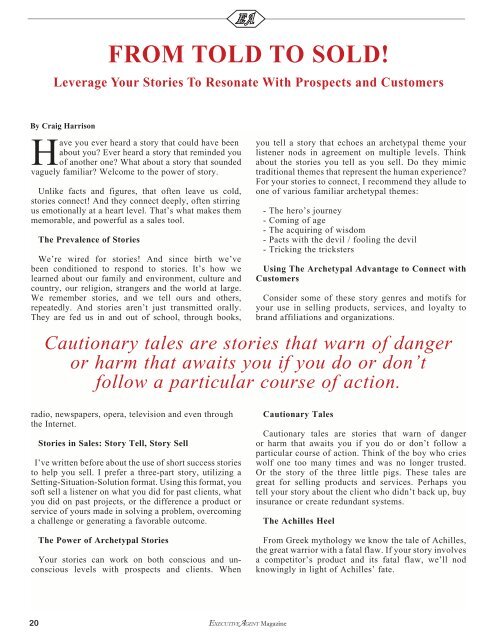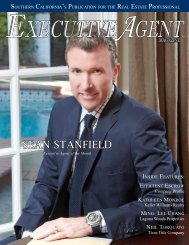Gail Anderson - Executive Agent Magazine
Gail Anderson - Executive Agent Magazine
Gail Anderson - Executive Agent Magazine
- No tags were found...
Create successful ePaper yourself
Turn your PDF publications into a flip-book with our unique Google optimized e-Paper software.
E A<br />
FROM TOLD TO SOLD!<br />
Leverage Your Stories To Resonate With Prospects and Customers<br />
By Craig Harrison<br />
Have you ever heard a story that could have been<br />
about you Ever heard a story that reminded you<br />
of another one What about a story that sounded<br />
vaguely familiar Welcome to the power of story.<br />
Unlike facts and figures, that often leave us cold,<br />
stories connect! And they connect deeply, often stirring<br />
us emotionally at a heart level. That’s what makes them<br />
memorable, and powerful as a sales tool.<br />
The Prevalence of Stories<br />
We’re wired for stories! And since birth we’ve<br />
been conditioned to respond to stories. It’s how we<br />
learned about our family and environment, culture and<br />
country, our religion, strangers and the world at large.<br />
We remember stories, and we tell ours and others,<br />
repeatedly. And stories aren’t just transmitted orally.<br />
They are fed us in and out of school, through books,<br />
you tell a story that echoes an archetypal theme your<br />
listener nods in agreement on multiple levels. Think<br />
about the stories you tell as you sell. Do they mimic<br />
traditional themes that represent the human experience<br />
For your stories to connect, I recommend they allude to<br />
one of various familiar archetypal themes:<br />
- The hero’s journey<br />
- Coming of age<br />
- The acquiring of wisdom<br />
- Pacts with the devil / fooling the devil<br />
- Tricking the tricksters<br />
Using The Archetypal Advantage to Connect with<br />
Customers<br />
Consider some of these story genres and motifs for<br />
your use in selling products, services, and loyalty to<br />
brand affiliations and organizations.<br />
Cautionary tales are stories that warn of danger<br />
or harm that awaits you if you do or don’t<br />
follow a particular course of action.<br />
radio, newspapers, opera, television and even through<br />
the Internet.<br />
Stories in Sales: Story Tell, Story Sell<br />
I’ve written before about the use of short success stories<br />
to help you sell. I prefer a three-part story, utilizing a<br />
Setting-Situation-Solution format. Using this format, you<br />
soft sell a listener on what you did for past clients, what<br />
you did on past projects, or the difference a product or<br />
service of yours made in solving a problem, overcoming<br />
a challenge or generating a favorable outcome.<br />
The Power of Archetypal Stories<br />
Your stories can work on both conscious and unconscious<br />
levels with prospects and clients. When<br />
Cautionary Tales<br />
Cautionary tales are stories that warn of danger<br />
or harm that awaits you if you do or don’t follow a<br />
particular course of action. Think of the boy who cries<br />
wolf one too many times and was no longer trusted.<br />
Or the story of the three little pigs. These tales are<br />
great for selling products and services. Perhaps you<br />
tell your story about the client who didn’t back up, buy<br />
insurance or create redundant systems.<br />
The Achilles Heel<br />
From Greek mythology we know the tale of Achilles,<br />
the great warrior with a fatal flaw. If your story involves<br />
a competitor’s product and its fatal flaw, we’ll nod<br />
knowingly in light of Achilles’ fate.<br />
20<br />
<strong>Executive</strong><strong>Agent</strong> <strong>Magazine</strong>
















